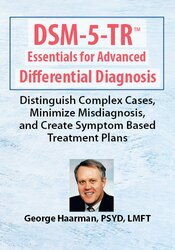
Sujets d'actualité :
×

Getting the diagnosis right is where treatment begins.
But let’s face it – mental health symptoms don’t always fit neatly into boxes.
With so much overlap between disorders, even experienced clinicians can struggle to pinpoint the correct diagnosis. And when things get missed or misidentified, treatment suffers – clients don’t get the help they need, outcomes decline, and trust can take a hit.
That’s why we’ve put together this training with George Haarman, PsyD, LMFT, a nationally respected expert in diagnosis and treatment planning. This isn’t just a review – it’s a hands-on, case-based training designed to help you fine-tune your clinical judgment and stay sharp with the DSM-5-TR™.
Vous apprendrez à :
This advanced training will give you the tools to make more accurate, culturally responsive diagnoses – and deliver the care your clients deserve.
Don’t miss it – purchase today!
*It may be helpful for participants to have a copy of DSM-5-TR™ available for reference.
Tous les membres du comité de planification de PESI, Inc. ont divulgué leurs relations financières avec des organisations non éligibles et toutes les relations non financières pertinentes avant de planifier le contenu de cette activité. Aucun des membres du comité n'avait de relations financières pertinentes avec des entreprises non éligibles ou d'autres relations potentiellement biaisées à divulguer aux apprenants. Pour les divulgations sur Conférenciers , veuillez consulter la biographie de la faculté.
Des informations sur les crédits de formation continue seront bientôt disponibles pour ce kit d'auto-apprentissage non interactif.
Des crédits de formation continue peuvent être disponibles pour certaines professions, comme indiqué dans le public cible. Les heures dépendront de la durée réelle de l'enregistrement. Veuillez vérifier les exigences spécifiques auprès de l'organisme d'agrément de votre État ou de votre organisation.
Des frais supplémentaires peuvent être facturés pour les certificats de formation continue. Veuillez contacter notre service clientèle au 1-800-844-8260 pour plus de détails.
**Le matériel inclus dans ce cours peut inclure des interventions et des modalités qui vont au-delà de la pratique autorisée de votre profession. En tant que professionnel agréé, vous êtes responsable de l'examen du champ d'application de la pratique, y compris des activités qui sont définies dans la loi comme dépassant les limites de la pratique, conformément aux normes de votre profession et dans le respect de celles-ci.

George B. Haarman, PsyD, LMFT, is a licensed clinical psychologist and a licensed marriage and family therapist with over 40 years of experience working in a variety of settings, including private practice, youth detention centers, juvenile group homes, child protective services, and juvenile probation. Dr. Haarman completed basic and advanced supervisor training required by the Kentucky Board of Psychology Examiners and maintains approval by the board to act as a supervisor. In his private practice, Dr. Haarman has provided clinical supervision to clinical and counseling practicum students as well as consultation about clinical supervision to psychologists for over 25 years. He is a national speaker on clinical supervision, depression, school refusal, ADHD, emotional disorders in children and adults and the DSM-5®. He is the author of three books: Clinical Supervision: Legal, Ethical, and Risk Management Issues, School Refusal: Children Who Can’t or Won’t Go to School, and Mastering DSM-5®. Dr. Haarman received his doctorate in clinical psychology from Spalding University in 1989. He has been an instructor at Jefferson Community College, Bellarmine University, and Spalding University.
Speaker Disclosures:
Financial: Dr. George Haarman maintains a private practice and is an adjunct professor Spalding University, Jefferson Community College, and Bellarmine University. He receives a speaking honorarium and recording royalties from PESI, Inc. He has no relevant financial relationships with ineligible organizations.
Non-financial: Dr. George Haarman is a member of the American Psychological Association and the Kentucky Psychological Association.
Consultez notre page FAQ à l'adresse https://www.pesicanada.ca/faq ou contactez-nous à l'adresse https://www.pesicanada.ca/contact-us.
L'accès à ce produit n'expire jamais.
History and Development of the DSM®
New Diagnosis in the DSM-5-TR™
Criteria Changes in DSM-5-TR™ and What it Means for You
Utilizing DSM-5-TR™ Symptoms in Treatment Planning
Diagnostic différentiel
Case Studies and Treatment Plans
Garantie de satisfaction
Votre satisfaction est notre objectif et notre garantie. Les questions doivent être adressées à info@pesicanada.com.
Veuillez patienter ...